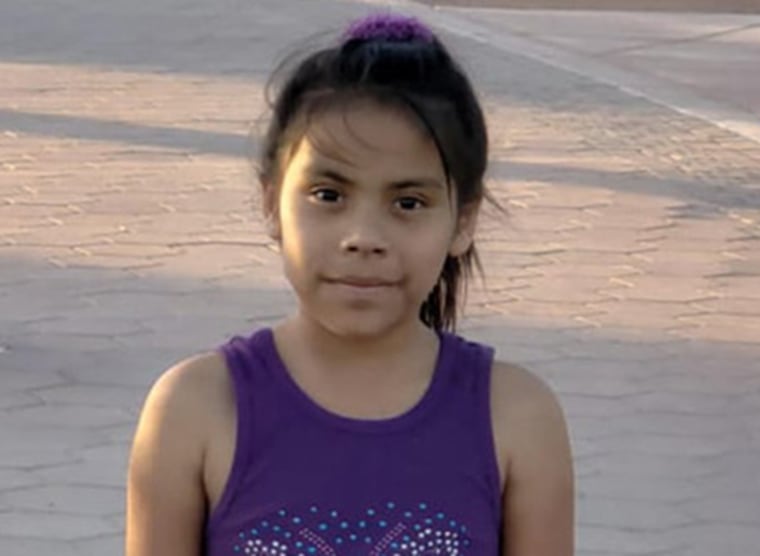For the last seven months, Vilma Carrillo has been separated from her 11-year-old daughter after arriving in the U.S. to seek asylum, having fled her native Guatemala and a husband who she says beat her.
“I’m sick, my head hurts, I just want to see my daughter,” Carrillo, 38, said in Spanish by phone from a detention center in Irwin, Georgia.
While a federal judge’s order has ordered the reunification of about 2,500 migrant children and their parents after they were separated under the Trump administration's policies, Carrillo and her daughter, Yeisvi, have remained apart.
A judge ordered Carrillo's deportation in August, after she and Yeisvi arrived in the U.S. in May. Her lawyers appealed the decision, but the case is complicated because Yeisvi, having been born in Georgia during the family's previous stint living in America, is a U.S. citizen.
While Carrillo waits for a decision on her deportation appeal, her lawyers fear she could lose custody of her daughter for good.

Carrillo said the last time she spoke to Yeisvi by phone, she asked: “Mommy, when are we going to be together? It’s going to be my birthday soon.”
Carrillo said she has been drawing pictures to mail to her daughter for her birthday on Dec. 21. After being separated from her mother, Yeisvi was transferred to the care of Arizona child protective services and currently lives with a foster family.
Carrillo said she had no idea her child would be taken from her when they arrived at the Arizona border.
“I never thought this would happen until they took her from me,” she said. “She was crying and crying when she left. She grabbed my waist and said, ‘No, mommy I don’t want to leave you.'"
Shana Tabak, executive director of the Tahirih Justice Center and one of the lawyers representing Carrillo, said Carrillo was not given a fair hearing because her asylum declaration and legal documents that could have been beneficial to her case were in a backpack that was taken from her when she arrived at Irwin.
While she speaks some Spanish, Carrillo is a native speaker of a Mayan language, and the interpreter at her immigration hearing spoke a different dialect, Tabak said.
The deportation appeal could take months or even longer, said Lynn Pearson, a staff attorney at the center.
Carrillo's case is further complicated by former Attorney General Jeff Sessions' decision restricting migrants who flee their home countries because of domestic or gang violence from being granted asylum. Sessions overruled a case granting asylum to a woman from El Salvador who fled domestic abuse, writing that the asylum statute "does not provide redress for all misfortune" and "generally" claims on domestic and gang violence will no longer qualify for asylum.The American Civil Liberties Union has sued the Trump administration over the order.
While Carrillo remains in detention, a judge in juvenile court held an initial hearing for Yeisvi in November, according to Tabak. Tabak said the case could result in the termination of Carrillo's parental rights if she was ordered deported or held in detention even longer.
If Carrillo were deported, the court could find that the allegations of domestic violence against her husband put Yeisvi at risk, Tabak said.
"The state might make the decision that, as a U.S. citizen, it's in her best interest to stay in the U.S," she said.
A lawyer representing Carrillo in Yeisvi's case said he could not comment on the record because the judge had ruled that the hearings be closed in order to protect the privacy of those involved, but said that in "cases like this, it's everybody's desire to reunite the parent with the child" providing that "that's the right thing to do."
Carrillo’s heartbreak intensified after she was transferred to Port Isabel detention center in Texas in July with other migrant mothers as part of the government’s family reunification efforts. She remained for a number of weeks but was told she was ineligible for reunification, Tabak said.
“She stayed at Port Isabel and watched the other moms be reunited with their kids and they never called her name,” she said.
Carrillo was then returned to Georgia without her daughter.
“I want to hug her. I’ve just been crying,” Carrillo said.
Yeisvi’s foster mother did not immediately return a request for comment.
Because Yeisvi is a citizen, she cannot be held at an immigration detention center.
A Customs and Border Protection spokesperson said that the administration's “zero-tolerance” policy leading to family separations at the border was not related to when a foreign national such as Carrillo comes to the U.S. with a child who is a American citizen. In those cases, the child is admitted to the U.S. and the parent is categorized as inadmissible, the spokesperson said.
Yeisvi was born in Vidalia, Georgia, in 2006, three years after Carrillo first came to the United States with her husband, according to a timeline provided by her lawyers.
The family returned to Huehuetanango, Guatamala, in 2007 to take care of Carrillo’s sick mother, according to the timeline.
It was in Guatemala that Carrillo’s husband became increasingly violent, according to Carrillo and Tabak. “He punched out her four front teeth in front of their daughter," Tabak said. "It was just terrible physical violence, at which point she decided to leave."
Carrillo said she fled to the U.S. because she feared for her life and the life of her daughter.
"It is because of the fear that we came here," she said, "not by choice."


